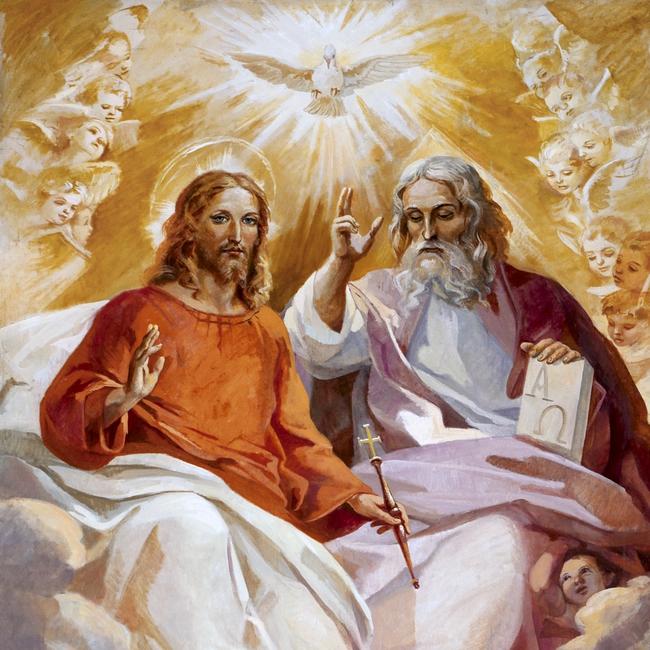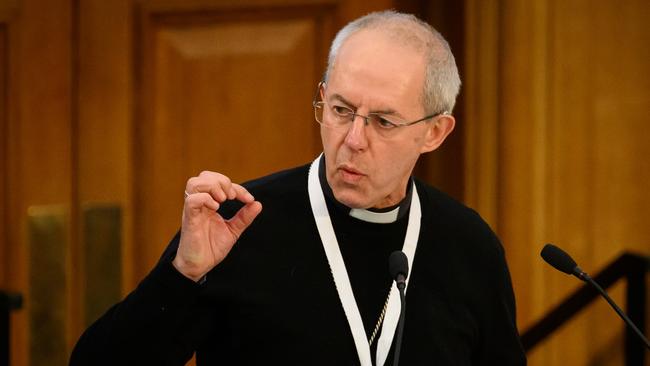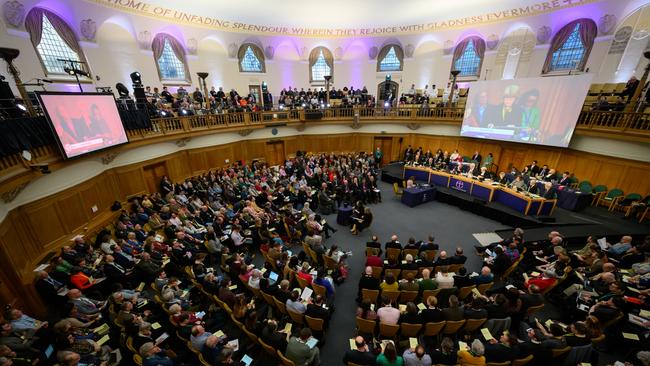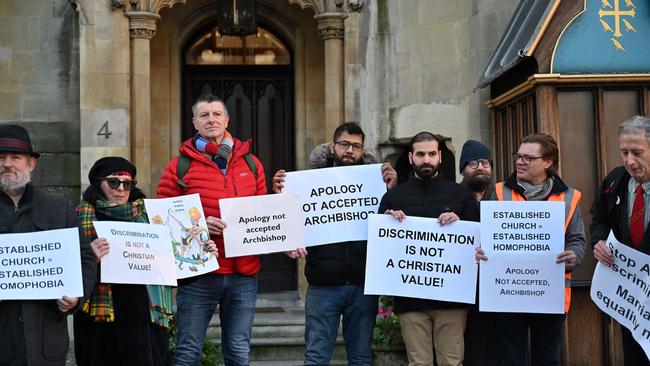‘God is not male’: Church of England giving God new pronouns
Some priests are already referring to God as “they and them” and have rewritten the Lord’s Prayer to start “Our Father and Mother”.

Lifestyle
Don't miss out on the headlines from Lifestyle. Followed categories will be added to My News.
The Church of England is considering scrapping centuries of religious teaching to give God gender-neutral pronouns.
The church, which is headed by King Charles III, confirmed that its Liturgical Commission has launched a special project to examine updating future teachings.
Some priests have already made such changes, trading references to “he” and “him” for simply “God” or even “they” and “them”, and rewriting the “Our Father” that starts the Lord’s Prayer to “Our Father and Mother”.
One unidentified priest defended the updated language — while conceding to the Times of London that critics “think we’re being a bit woke”.
“God is not male. Certainly not the white cis male with a beard, sitting on a cloud we seem to reduce and limit God to so often,” the Rev. Chantal Noppen also told the UK Times.
The archbishop of Canterbury, Justin Welby, the religious head of the church, previously said that “God is not male or female” or “definable”.
“All human language about God is inadequate and to some degree metaphorical,” he said in 2018.
However, the Rev. Ian Paul, a member of the Archbishops’ Council of the Church of England, was among those decrying it as a step too far.

“If the Liturgical Commission seeks to change this, then in an important way they will be moving the doctrine of the church away from being grounded in the Scriptures,” he told the outlet.
He stressed that “male and female imagery is not interchangeable,” while also claiming that critics were misreading the teachings.
“The use of male pronouns for God should not be understood as implying that God is male — which is a heresy. God is not sexed, unlike humanity,” he stressed.
“The fact that God is called ‘Father’ can’t be substituted by ‘Mother’ without changing meaning, nor can it be gender-neutralised to ‘Parent’ without loss of meaning. Fathers and mothers are not interchangeable but relate to their offspring in different ways,” he stressed.
Prof. Helen King, the vice chairman of the synod’s gender and sexuality group, acknowledged that such “questions around gendered language and God have been around for decades, if not centuries.”
Even so, they “still have the power to bring out strong reactions,” she said.
“Clearly God is not gendered, so why do we restrict our language for God in gendered ways?” she asked.
The group Women and the Church said that “a theological misreading of God as exclusively male is a driver of much-continuing discrimination and sexism against women.”
The Rev. Miranda Threlfall-Holmes also told the UK Times that the view that “God is a man” had been used to oppose women bishops.
The plan first emerged after a female reverend asked the commission if there was an update “to develop more inclusive language” given that “many of the prayers offered for use refer to God using male pronouns.”
The commission’s vice chair, Bishop of Lichfield Michael Ipgrave, replied that it had “been exploring the use of gendered language in relation to God for several years”.

“After some dialogue … a new joint project on gendered language will begin this spring,” Ipgrave wrote in a formal reply.
A spokesman for the Church of England stressed that the debate “is nothing new.”
“Christians have recognised since ancient times that God is neither male nor female, yet the variety of ways of addressing and describing God found in scripture has not always been reflected in our worship,” the church rep said.
Still, the rep insisted that any changes would only apply to future teachings.
“There are absolutely no plans to abolish or substantially revise currently authorised liturgies, and no such changes could be made without extensive legislation,” the spokesperson said.
The Church’s Faith and Order Commission, which advises on theology, will work with the liturgical commission on looking at questions around gender terms, the spokesperson said.
Same-sex marriage debate rages on
It comes as The Church of England debates contentious plans to allow priests to offer blessings to same-sex couples, amid deep Anglican divisions over the issue in Britain and beyond.
Hundreds of members of the General Synod — the Church’s elected governing body, which meets two or three times a year — spent five hours discussing and voting on the proposals unveiled last month by bishops.
They are set to return Thursday to conclude the debate and hold a final vote on whether to support the reforms.
They include no change to rules banning Anglican priests from officiating at weddings of same-sex couples. But under the plans, they could offer “God’s blessing” for civil marriages or civil partnerships in a church.
Meanwhile in an open letter, bishops last month also issued an unprecedented apology directly to LGBTQ people for the sometimes “hostile and homophobic response” they have faced in parishes.
While the moves — which follow nearly six years of internal debate on the issue — have been welcomed by some as progress, others have said they do not go far enough.
In a sign of the stark splits within the Church, bishops and clergy from both camps addressed Synod attendees with impassioned pleas to back or block the plans and various related amendments.
“I’m supporting these resources not … because I’m controlled by culture but because of scripture, tradition and reason evidenced in the vast work done over the last six years,” Archbishop of Canterbury Justin Welby said.

However, moments later Vaughan Roberts, rector of an evangelical church in Oxford, central England, implored the Synod to reject the reforms.
“I believe the approach it offers will not keep us united, but will only drive us further apart,” he cautioned.
Earlier, veteran UK gay rights campaigner Peter Tatchell described blessings without a marriage as “an insult”.
He said same-sex couples should be able to marry in their own parish church. “This is a right extended to every heterosexual man and woman in England, regardless of their religion — but not to LGBTs. That’s discrimination, and discrimination is not a Christian value.” Jayne Ozanne, a Synod member and LGBTQ campaigner, issued her own condemnation of the belated apology.
“We’ve had years of apologies from our bishops but no action,” she told AFP ahead of Wednesday’s debate, when her amendment seeking a more progressive stance was soundly rejected.
“It’s like an abusive relationship where someone keeps hitting you and then says ‘I’m sorry, I’m sorry’.
“Until the discrimination and the abuse stop, we don’t want to hear more empty words. We need action first.” But the conservative Church of England Evangelical Council has railed against the reforms.
It says they will create “further division and broken fellowship” within the Church, and “a greater tearing of the fabric of the worldwide Anglican Communion”.
“There will also be a deep fracture within the Church of England because many of us cannot go along with this, and will be forced to distance ourselves from those who do,” Roberts added in his comments.

The Church of England has been under political pressure to reform its approach ever since same-sex marriage became legal in England in 2013.
Although dozens of other countries have legalised same-sex unions, homosexuality remains banned in many parts of the world.
That includes in highly religious and conservative countries in sub-Saharan Africa, which help make up the Anglican Communion of 43 Churches in 165 countries.
It boasts around 85 million members, and is the third largest Christian communion after the Roman Catholic and Eastern Orthodox churches.
A rift appears to have emerged between Archbishop of Canterbury Welby and some of these Anglican churches, which often support tougher curbs on the LGBTQ community rather than liberalising existing doctrine.
The reforms do not seek to change Church of England law, and so do not require formal Synod approval. But members will vote on a motion of support which, if rejected, could make it practically impossible for them to proceed.
The Church of England is not the only major Christian communion confronting major tensions on the issue, with the Catholic Church also plagued by divisions.
Pope Francis has stirred controversy with his relatively liberal attitude towards sexual orientation, which is at odds with the beliefs of many Catholic conservatives.
But the pope has also frustrated modernisers by sticking firmly to Catholic teaching that marriage is the union between a man and a woman.
— with AFP
Originally published as ‘God is not male’: Church of England giving God new pronouns


